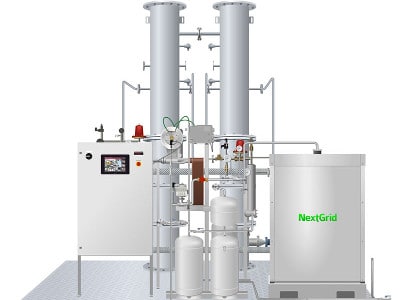
 Mississauga’s NextGrid Inc. will be taking a $300,000 investment from Sustainable Development Technology Canada (SDTC) to develop a pilot project for its Green Turbine combined heat and power (CHP) system, with financial participation from the Canadian Gas Association.
Mississauga’s NextGrid Inc. will be taking a $300,000 investment from Sustainable Development Technology Canada (SDTC) to develop a pilot project for its Green Turbine combined heat and power (CHP) system, with financial participation from the Canadian Gas Association.
NextGrid’s patent pending Green Turbine micro-steam turbine is about the size of a football, and uses steam to generate heat and electricity, an approach that the company hopes will decentralize electricity production.
The pilot project will be installed at a commercial property in Toronto, with an eye towards further commercializing the technology.
It may strike the reader that returning to steam for power generation is a step backwards in history, to the age of the great steam engines that powered ships and locomotives and turbines, and contributed to the rise of the first modern Industrial Revolution in the 18th century.
NextGrid has developed a micro-turbine that boasts an efficiency rate of 95%, as compared to the normal range for CHP systems that typically achieve maximum rates of efficiency between 75-80%, owing to something called the Carnot Cycle.
The electricity grid as we know it, like all post-war infrastructure in North America, is in bad shape, having been more or less neglected for decades with not much more than immediate funding for emergency repairs, never mind a focused investment in future-proofing the system.
The American Society of Engineers estimates that $673 billion will need to be invested by 2020 in order to properly fix the U.S. national grid.
Consumers can either swallow that investment by paying higher electricity rates, or they can implement in-house power generation solutions.
Compared to incumbent technologies, NextGrid’s CHP technology also lowers NOx emissions at an industry leading 0-3 parts per million and promises a 47% GHG emission reduction while delivering the highest fuel efficiency among comparable solutions.
NextGrid estimates that there are more than 3.5 million commercial hot water boilers that need to be replaced in North America, all of which could be swapped out for a refrigerator-sized NextGrid CHP system.
Larger solutions can be implemented in multi-unit residential buildings, hotels, casinos, or any other building that has large-scale constant demand for energy.
While it’s unlikely that collectively we’ll all simply give up on the idea of having a centralized grid, part of the solution to that problem can be achieved by decentralizing power, allowing companies and consumers to set up their own infrastructure for local power generation.
That approach is gaining traction with the spread of solar energy and renewables, not to mention Tesla’s Powerwall home battery.
The funding for NextGrid was part of an overall $206 million funding package disbursed among 36 cleantech projects across Canada, announced last month by Canada’s Minister of Innovation, Science and Economic Development, Navdeep Bains.
Leave a Reply
You must be logged in to post a comment.




 Share
Share Tweet
Tweet Share
Share




Comment